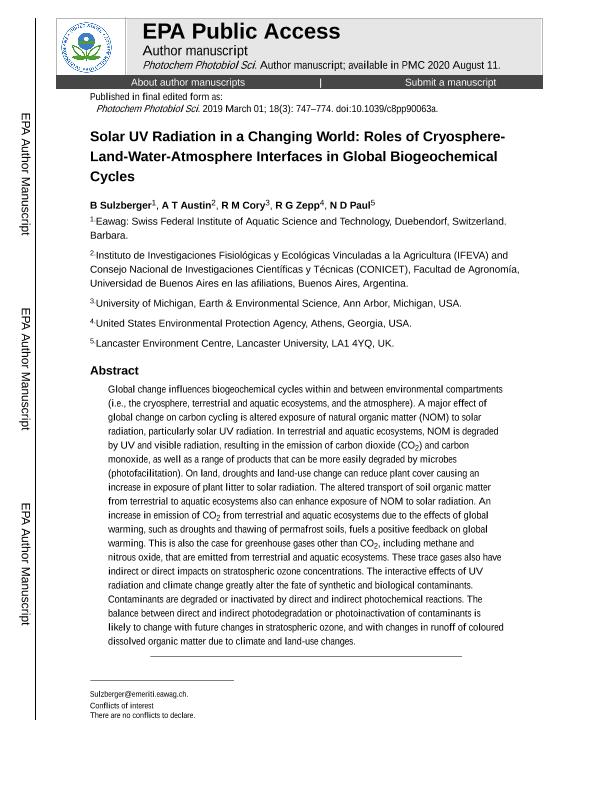Artículo
Solar UV radiation in a changing world: roles of cryosphere-land-water-atmosphere interfaces in global biogeochemical cycles
Fecha de publicación:
01/2019
Editorial:
Royal Society of Chemistry
Revista:
Photochemical and Photobiological Sciences
ISSN:
1474-905X
Idioma:
Inglés
Tipo de recurso:
Artículo publicado
Clasificación temática:
Resumen
Global change influences biogeochemical cycles within and between environmental compartments (i.e., the cryosphere, terrestrial and aquatic ecosystems, and the atmosphere). A major effect of global change on carbon cycling is altered exposure of natural organic matter (NOM) to solar radiation, particularly solar UV radiation. In terrestrial and aquatic ecosystems, NOM is degraded by UV and visible radiation, resulting in the emission of carbon dioxide (CO2) and carbon monoxide, as well as a range of products that can be more easily degraded by microbes (photofacilitation). On land, droughts and land-use change can reduce plant cover causing an increase in exposure of plant litter to solar radiation. The altered transport of soil organic matter from terrestrial to aquatic ecosystems also can enhance exposure of NOM to solar radiation. An increase in emission of CO2 from terrestrial and aquatic ecosystems due to the effects of global warming, such as droughts and thawing of permafrost soils, fuels a positive feedback on global warming. This is also the case for greenhouse gases other than CO2, including methane and nitrous oxide, that are emitted from terrestrial and aquatic ecosystems. These trace gases also have indirect or direct impacts on stratospheric ozone concentrations. The interactive effects of UV radiation and climate change greatly alter the fate of synthetic and biological contaminants. Contaminants are degraded or inactivated by direct and indirect photochemical reactions. The balance between direct and indirect photodegradation or photoinactivation of contaminants is likely to change with future changes in stratospheric ozone, and with changes in runoff of coloured dissolved organic matter due to climate and land-use changes.
Palabras clave:
UV RADIATION
,
BIOGEOCHEMICAL CYCLES
,
SOLAR RADIATION
,
CLIMATE CHANGE
Archivos asociados
Licencia
Identificadores
Colecciones
Articulos(IFEVA)
Articulos de INST.D/INV.FISIOLOGICAS Y ECO.VINCULADAS A L/AGRIC
Articulos de INST.D/INV.FISIOLOGICAS Y ECO.VINCULADAS A L/AGRIC
Citación
Sulzberger, B.; Austin, Amy Theresa; Cory, R. M.; Zepp, R. G.; Paul, N. D.; Solar UV radiation in a changing world: roles of cryosphere-land-water-atmosphere interfaces in global biogeochemical cycles; Royal Society of Chemistry; Photochemical and Photobiological Sciences; 18; 3; 1-2019; 747-774
Compartir
Altmétricas




